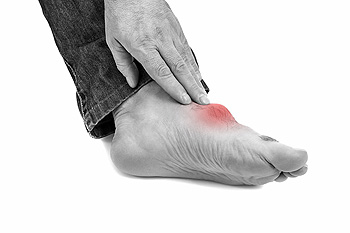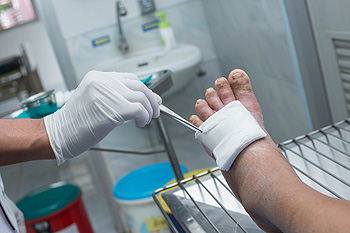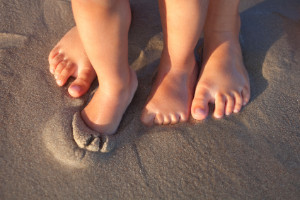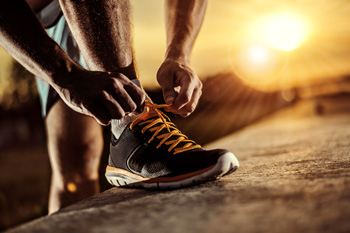Freehold (732) 294-9393
Freehold (732) 294-9393
 The medical condition that is known as gout can be uncomfortable. This form of arthritis generally causes severe pain and discomfort in the big toe and surrounding areas. The pain comes from the joints, and is caused by elevated uric acid levels in the blood. Many patients who experience gout attacks equate the pain to needle-like sensations, and it may be painful if anything touches the toe. Symptoms of this condition often include redness and swelling around the affected joints. Research has indicated that this ailment can develop from genetic traits, or from certain foods that are eaten. These can include red meat, shellfish, and drinks that have large amounts of sugar in them. A proper diagnosis can consist of having a blood test performed which may be helpful in determining the amount of uric acid that is present. Additionally, it may be beneficial to use a needle to remove a portion of the crystals from the painful joints. If you have been afflicted with gout attacks, it is suggested that you speak to a podiatrist who can properly treat this condition.
The medical condition that is known as gout can be uncomfortable. This form of arthritis generally causes severe pain and discomfort in the big toe and surrounding areas. The pain comes from the joints, and is caused by elevated uric acid levels in the blood. Many patients who experience gout attacks equate the pain to needle-like sensations, and it may be painful if anything touches the toe. Symptoms of this condition often include redness and swelling around the affected joints. Research has indicated that this ailment can develop from genetic traits, or from certain foods that are eaten. These can include red meat, shellfish, and drinks that have large amounts of sugar in them. A proper diagnosis can consist of having a blood test performed which may be helpful in determining the amount of uric acid that is present. Additionally, it may be beneficial to use a needle to remove a portion of the crystals from the painful joints. If you have been afflicted with gout attacks, it is suggested that you speak to a podiatrist who can properly treat this condition.
Gout is a painful condition that can be treated. If you are seeking treatment, contact Dr. Henry Miller from New Jersey. Our doctor will treat your foot and ankle needs.
What Is Gout?
Gout is a form of arthritis that is characterized by sudden, severe attacks of pain, redness, and tenderness in the joints. The condition usually affects the joint at the base of the big toe. A gout attack can occur at any random time, such as the middle of the night while you are asleep.
Symptoms
Risk Factors
Prior to visiting your podiatrist to receive treatment for gout, there are a few things you should do beforehand. If you have gout you should write down your symptoms--including when they started and how often you experience them, important medical information you may have, and any questions you may have. Writing down these three things will help your podiatrist in assessing your specific situation so that he or she may provide the best route of treatment for you.
If you have any questions, please feel free to contact our office located in Freehold, NJ . We offer the newest diagnostic and treatment technologies for all your foot care needs.
 Many diabetic patients are aware of the necessity of checking their feet on a daily basis. This can be helpful in noticing if there are cuts, scrapes, or bruises. It is important for wounds that are found on the feet to be promptly treated, as this may be beneficial in preventing infections. It can be common for diabetic patients to experience the condition known as neuropathy. This is a condition that makes it difficult to feel if there are existing cuts and can lead to painful foot ulcers. Proper foot care typically consists of wearing shoes that fit correctly, trimming the toenails properly, and not walking barefoot. If you have diabetes, it is strongly advised that you are under the care of a podiatrist who can help you to manage your condition.
Many diabetic patients are aware of the necessity of checking their feet on a daily basis. This can be helpful in noticing if there are cuts, scrapes, or bruises. It is important for wounds that are found on the feet to be promptly treated, as this may be beneficial in preventing infections. It can be common for diabetic patients to experience the condition known as neuropathy. This is a condition that makes it difficult to feel if there are existing cuts and can lead to painful foot ulcers. Proper foot care typically consists of wearing shoes that fit correctly, trimming the toenails properly, and not walking barefoot. If you have diabetes, it is strongly advised that you are under the care of a podiatrist who can help you to manage your condition.
Diabetic foot care is important in preventing foot ailments such as ulcers. If you are suffering from diabetes or have any other concerns about your feet, contact Dr. Henry Miller from New Jersey. Our doctor can provide the care you need to keep you pain-free and on your feet.
Diabetic Foot Care
Diabetes affects millions of people every year. The condition can damage blood vessels in many parts of the body, especially the feet. Because of this, taking care of your feet is essential if you have diabetes, and having a podiatrist help monitor your foot health is highly recommended.
The Importance of Caring for Your Feet
Patients with diabetes should have their doctor monitor their blood levels, as blood sugar levels play such a huge role in diabetic care. Monitoring these levels on a regular basis is highly advised.
It is always best to inform your healthcare professional of any concerns you may have regarding your feet, especially for diabetic patients. Early treatment and routine foot examinations are keys to maintaining proper health, especially because severe complications can arise if proper treatment is not applied.
If you have any questions please feel free to contact our office located in Freehold, NJ . We offer the newest diagnostic and treatment technologies for all your foot and ankle needs.
 When babies are born, their feet are generally soft and flexible. Research has shown the feet may become stronger when walking is done barefoot while indoors. This may help to strengthen the overall foot as the toes grasp the floor for balance. When the first pair of shoes are purchased, it is helpful that the shoes are made of lightweight and breathable materials. Additionally, there needs to be adequate room at the top of the shoes so the toes can move freely. This may help to prevent ingrown toenails from developing. Good foot hygiene begins with teaching your child how to properly wash and dry their feet, in addition to helping them to stretch their feet. If you would like more information about how to care for children’s feet, please consult with a podiatrist.
When babies are born, their feet are generally soft and flexible. Research has shown the feet may become stronger when walking is done barefoot while indoors. This may help to strengthen the overall foot as the toes grasp the floor for balance. When the first pair of shoes are purchased, it is helpful that the shoes are made of lightweight and breathable materials. Additionally, there needs to be adequate room at the top of the shoes so the toes can move freely. This may help to prevent ingrown toenails from developing. Good foot hygiene begins with teaching your child how to properly wash and dry their feet, in addition to helping them to stretch their feet. If you would like more information about how to care for children’s feet, please consult with a podiatrist.
The health of a child’s feet is vital to their overall well-being. If you have any questions regarding foot health, contact Dr. Henry Miller of New Jersey. Our doctor can provide the care you need to keep you pain-free and on your feet.
Tips for Keeping Children's Feet Healthy
If you have any questions, please feel free to contact our office located in Freehold, NJ . We offer the newest diagnostic and treatment technologies for all your foot care needs.
 Research has indicated it may be beneficial to purchase running shoes based on the type of running that is desired. When shoes are changed approximately every five hundred miles, they may last as long as they can before they lose their elasticity. Many runners are aware of the importance of having two pairs of running shoes, and alternating between them. When shoes are purchased, it is helpful to look for shoes that have a solid heel. This may ensure the ankle is kept stable. If the shoe is easy to twist, it generally indicates this type of running shoe has less midfoot support. If you are interested in learning more about how to buy running shoes, it is advised that you consult with a podiatrist who can offer you useful tips.
Research has indicated it may be beneficial to purchase running shoes based on the type of running that is desired. When shoes are changed approximately every five hundred miles, they may last as long as they can before they lose their elasticity. Many runners are aware of the importance of having two pairs of running shoes, and alternating between them. When shoes are purchased, it is helpful to look for shoes that have a solid heel. This may ensure the ankle is kept stable. If the shoe is easy to twist, it generally indicates this type of running shoe has less midfoot support. If you are interested in learning more about how to buy running shoes, it is advised that you consult with a podiatrist who can offer you useful tips.
You should always make sure your running shoes fit properly in order to avoid injury. For more information, contact Dr. Henry Miller from New Jersey. Our doctor can provide the care you need to keep you pain-free and on your feet.
Choosing the Right Running Shoe for Your Foot Type
Improper shoe sizing can cause a myriad of problems for your feet. Shoes that don’t fit you properly can lead to muscular imbalances in your body, which can result in foot, knee, and hip injuries.
Tips for Finding the Right Running Shoe
If you have any questions please feel free to contact our our office located in Freehold, NJ . We offer the newest diagnostic and treatment technologies for all your foot and ankle needs.